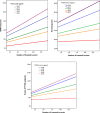Perceived social support functions as a resilience in buffering the impact of trauma exposure on PTSD symptoms via intrusive rumination and entrapment in firefighters
- PMID: 31374563
- PMCID: PMC6677557
- DOI: 10.1371/journal.pone.0220454
Perceived social support functions as a resilience in buffering the impact of trauma exposure on PTSD symptoms via intrusive rumination and entrapment in firefighters
Abstract
Resilience has been highlighted as a pivotal factor in overcoming the detrimental impact of trauma. The present study tests a resilience model of trauma using risk (rumination, emotion regulation, and entrapment) and protective (perceived social support) factors in a sample of firefighters who are at heightened risk for post-traumatic stress disorder, using a cross-sectional design. Specifically, the present study focuses on perceived social support as a resilience factor against PTSD symptoms, in response to trauma exposure. The sample included 545 firefighters from six large cities in Korea, who completed the following self-report questionnaires: Life Event Checklist, Event-related Rumination Inventory, Emotion Regulation Questionnaire, Entrapment scale, Impact of Event Scale-Revised, and Duke-UNC Functional Social Support Questionnaire. Exposure to traumatic events indirectly affected PTSD symptoms via intrusive rumination, emotional regulation, and perceptions of entrapment. Additionally, the mediating effects of intrusive rumination and perceptions of entrapment were moderated by perceived social support. That is, firefighters with high levels of perceived social support reported lower severity of rumination and PTSD symptoms. These findings suggest that perceptions of social support may operate as a resilience factor in buffering the effects of trauma on PTSD symptoms. Perceived social support interacts with intrusive rumination and perceptions of entrapment, thereby resisting the development of PTSD symptoms.
Conflict of interest statement
The author has declared that no competing interests exist.
Figures


References
-
- Gilbertson MW, McFarlane AC, Weathers FW, Keane TM, Yehuda R, Shalev AY, et al. Is trauma a causal agent of psychopathologic symptoms in posttraumatic stress disorder? Findings from identical twins discordant for combat exposure. J Clin Psychiatry. 2010. - PubMed
-
- Corneil W, Beaton R, Murphy S, Johnson C, Pike K. Exposure to traumatic incidents and prevalence of posttraumatic stress symptomatology in urban firefighters in two countries. J Occup Health Psychol. 1999;4(2):131 - PubMed
-
- Glantz MD, Sloboda Z. Analysis and reconceptualization of resilience Resilience and development: Springer; 2002. p. 109–26.
Publication types
MeSH terms
LinkOut - more resources
Full Text Sources
Medical
Molecular Biology Databases

